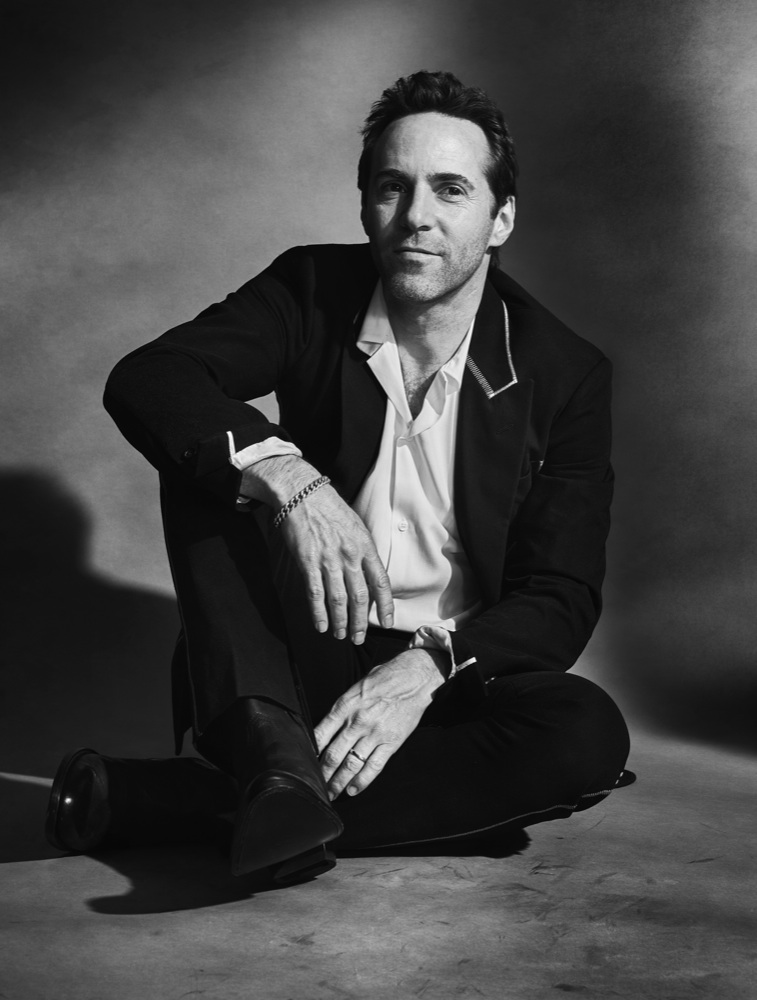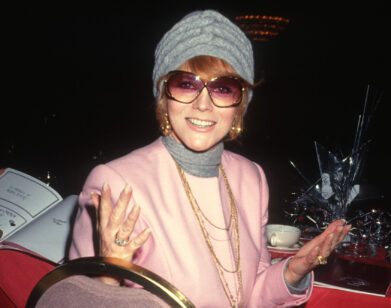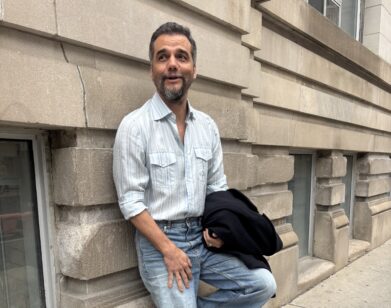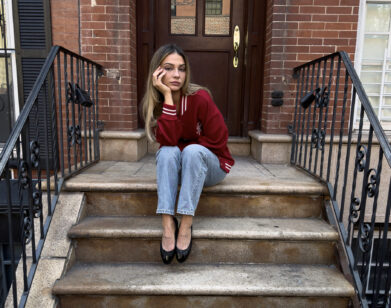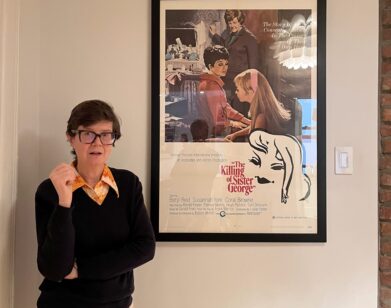Alessandro Nivola
ALESSANDRO NIVOLA IN NEW YORK, MAY 2017. PHOTOS: DAVID NEEDLEMAN/JONES MANAGEMENT. STYLING: MICHAEL FISHER/THE WALL GROUP. GROOMING: AMY KOMOROWSKI FOR ART DEPARTMENT. PHOTO ASSISTANT: JUANKR ZORRILLA. STYLING ASSISTANT: MARY INACIO. RETOUCHING: FEATHER CREATIVE.
A few days ago I found myself in a taxi headed to LaGuardia airport with my good friend Alessandro Nivola. We had agreed to do this interview for Interview, so it seemed the perfect time. For those of you who don’t know, Alessandro Nivola is an American actor and producer (no, he‘s not British). He has been fantastic in a shit-ton of good films: Face/Off, Laurel Canyon, Coco before Chanel, American Hustle, A Most Violent Year, Who Do You Love?, (the absolutely brilliant) Junebug, and last year’s winner for most warped head-spinner of a film, Neon Demon. In 2014 he was nominated for a Tony when he starred opposite Bradley Cooper in a revival of The Elephant Man on Broadway.
He’s on a hot streak at the moment: he’s about to be seen this month starring opposite Robert DeNiro in HBO’s The Wizard of Lies in a performance that’s generating awards talk. He just wrapped Sebastian Lelio’s three-hander Disobedience opposite Rachel Weisz and Rachel McAdams, and last month he won the Best Actor award at the Tribeca Film Festival for his role in Liz Garcia’s indie One Percent More Humid. In July he’ll head to South Africa to star opposite Chris Evans in Gideon Raff’s Red Sea Diving Resort. He also appears in Lynne Ramsay‘s You Were Never Really Here with Joaquin Phoenix, which was just announced in competition at Cannes and he stars alongside his wife Emily Mortimer in a live action virtual reality short film Broken Night, which is also set for Cannes. It’s one of the first times actors are doing a narrative story line with VR. It’s the future.
As a friend I can tell you he is an inspiration as a man, husband, father, and artist. He has had many accolades and many rave reviews, but my favorite thing anyone ever said about Alessandro was the genius rock critic Greil Marcus in Pitchfork: “Alessandro Nivola is magnetic. You want to know what he’s going to do next. You don’t ever know what he’s really thinking, and you’re not even sure he knows. Maybe he’s running on instinct, but he’s got great instincts. He’s afraid of absolutely nothing.” —Ethan Hawke
ETHAN HAWKE: It annoys me when I read these kinds of interviews where two people who know each other are doing an interview. How the fuck do they know each other? Why do actors always seem to know each other? I find it a little annoying actually. Like Casey Affleck and Matt Damon are best friends, how the fuck did that happen? Why? Not that we’re as cool as they are. We’re like some second tier version. Do you remember when we first met?
ALESSANDRO NIVOLA: Yeah, so I had this girlfriend at Yale…
HAWKE: Oh no. This is not the story I remember. This is gonna go bad.
NIVOLA: Well, maybe this is not the first time we met…
HAWKE: No, no. It’s the first time you remember.
NIVOLA: I had this girlfriend at Yale and she had gone to Princeton High School with [writer, director, and producer] Mike Showalter. She was always coming into the city from Yale, and hanging out with these cool guys from that sketch comedy show, The State. And she would bring me, the innocent babe in the woods that I was. I didn’t have any connection with the whole New York scene at all. She kept bringing me into these really cool parties, and the first time I came in was during the daytime on the weekend, and it was in Showalter’s apartment, or one of those guys… Everybody was milling around looking really cool, you know? You were there.
HAWKE: Were we playing dice? Showalter liked to play dice back then…
NIVOLA: Yeah, you probably were! It was just cool, everybody had black suits and converse on.
HAWKE: Funnily enough because I’m so competitive, I remember seeing you in A Month in the Country and thinking, “Oh fuck, this guy is good.” I remember us hanging out at Café Un Deux Trois after a performance. Was that your Broadway debut?
NIVOLA: Yeah. Not only was that my Broadway debut, that was my New York anything debut. I’d never done a play, or a movie, or anything in New York.
HAWKE: How’d you get the part?
NIVOLA: I’d been doing a lot of regional theater for the past year. And while I was at Yale I left school a few times and did plays out of town. So by the time I got into New York having graduated from Yale, I’d already done all this Chekov and shit, and Athol Fugard… I had a lot of theater experience when I first arrived in New York.
HAWKE: That was kind of an explosive moment. Wasn’t Jude Law making his debut then? And Rufus Sewell? Jonny Lee Miller was around. Ewan McGregor. There were a bunch of young English guys…
NIVOLA: There was definitely a moment. In fact, we all met each other doing this shoot for Vanity Fair that was titled “Boys of Broadway.”
HAWKE: I remember, because you know, I was already becoming passé at that moment. You guys were all the new badass kids in town.
NIVOLA: That was when I first got introduced to all these English guys. I’d never really been to England, but it ended up that half of my career was spent over there. And a lot of it was that I got seduced by this crowd of guys that were in New York.
HAWKE: I remember thinking that you were British.
NIVOLA: For a long time a lot of people thought that because I’d done so many roles with English accents. People probably still think it. Or they don’t think anything.
HAWKE: When I was directing [Sam Shepard’s play] A Lie of the Mind [Off-Broadway in 2010], I’d dreamed of this production for a long time in my head and I was really excited about it. You were having this cookout at your dad’s place. I forget where my family was, I think everybody was out of town, I didn’t even have a car, I had to ride my bike over there. You were by the fire playing this music on the guitar that was truly badass. And then I got obsessed with you playing the lead of A Lie of the Mind and how good you would be in it. And I offered it to you and you said yes. That’s how we got to really know each other.
NIVOLA: I don’t remember playing the guitar then, but I’m so glad I was!
HAWKE: I remember we drank a lot and I had to ride my bike home. And it was so much farther on the way back.
NIVOLA: You know, you say you’re so competitive, but you are the most encouraging actor-friend that I have. The thing that I remember more than anything in the whole experience of doing A Lie of the Mind, was we had rehearsed for a couple of weeks and Sam Shepard had said he wanted nothing to do with the production. Then one day out of nowhere he showed up in the middle of our rehearsal—walked in and sat down in the back of the room. We were all shitting ourselves and trying to pretend it was no big deal. We went through the rehearsal, and were really experimenting, and it got kind of crazy. Then when we were all packing up to leave I saw you and Sam Shepard whispering before he left. You took me out onto that balcony to have a cigarette or something and you said, “You’re not gonna believe what Shepard just said. He said, ‘Who is that guy? He can really act.'” I don’t think I’ve ever felt better than that day.
HAWKE: You’re being coy. He was really hyperbolic about it. He was like, “Where did you find this kid? He’s a fucking rockstar!”
NIVOLA: Shit, I forgot that. I’m glad we’re doing this interview.
HAWKE: That’s why I had to tell you. I was like, “Man, if Sam Shepard said something like that about me I would want to know.”
NIVOLA: But for you as an actor, to give that to another actor, it’s an unusual thing. We’ve always been generous that way with each other, but it’s not a normal thing.
HAWKE: I’ll never forget Philip Seymour Hoffman calling me up one day and saying, “Did you see Half Nelson?” Which was Ryan Gosling’s first movie Phil ever saw him in. I was like, “No.” And he goes, “Ahhh, fuck.”And I’m like, “Why, what is it?” And he says, “Kid can act.” He said it like: “Damn it! There’s another one.” I remember I felt that way about you when I saw you in A Month in the Country, I was like, “Ahh, fuck! I’m gonna lose a ton of parts to this dude.”
It might be interesting for people to know what a serious artist your grandfather, Costantino Nivola, was. I’ve seen a lot of your grandfather’s art and it’s tremendous. He was a contemporary of Jackson Pollock’s, right?
NIVOLA: Yeah, he was an Italian immigrant who came to America in the late 1940s. In 1949 he moved out to an area in eastern Long Island near Amagansett called the Springs. It became a spot in the ’50s and ‘60s where a lot of abstract impressionist painters and sculptors all moved out of the city and set up their studios. De Kooning, Pollock, Rothko, Saul Steinberg—they were all living out there and and fraternizing. Pollock’s house was walking distance from my grandfather’s house. They all knew each other and used to give each other their art as they were experimenting, asking each other their opinion on things.
So Pollock gave my grandfather one of his first really abstract splatter paintings, and my grandfather put it up on his wall for about a week in his house. In fact, there’s a photograph that I have of my grandfather sitting in this chair with his back to the camera and his hands behind his head, staring at the Pollock painting up on the wall. The painting sat there for a week, and at the end of the week he brought it back to Pollock and gave it back. My grandfather said, “Hey Jackson, I can’t keep this painting, it makes me nervous.”
Then five years ago there was this Jackson Pollock retrospective at the MoMA. I was walking through and I saw this painting that looked so familiar. I looked it up and it was the same painting, that my grandfather had given back. And it had sold from Sotheby’s for like 30 million dollars.
HAWKE: I’m catching you at a very weird moment in your life, because you’re at this junction where there’s a lot of things happening. You’re not going to toot your own horn, so I’ll toot it for you. You just won Best Actor at Tribeca for One Percent More Humid, and this is a strange, weird thing I’ve seen happen in my own life and in other people’s lives—where good and bad things happen concurrently. Your father just passed away and simultaneously there’s all these amazing blessings that are happening. It’s strange how life works like that.
NIVOLA: My dad died three weeks ago, and it was so emotional leading up to his death in a million different, complicated ways. But since he died I’ve felt completely emotionally cut off from it. I just feel nothing. We were really close but I just feel numb or something. The first little stab that I got was when I won that award the other night at Tribeca. I just wanted to call him, you know?
HAWKE: I can imagine. And you had just finished Disobedience with Rachel McAdams and Rachel Weisz. I’ve never seen you pour yourself into a character like you did with that one. I can’t wait to see this character because it was affecting you, it made an impression on you in a way that not all parts do.
NIVOLA: Disobedience was directed by Sebastián Lelio, a Chilean guy who’s on the way up in a big way. It was one of the most exciting roles I’d ever been offered and I was elated when it came along. A week later I find out my dad was going to die, he had three to six months to live. So maybe he would die even while I was making the movie. So I told them I didn’t think I could do it. Then I was with my dad processing the shock of his situation… We were spending a lot of time together and it was obviously very emotionally charged. I explained the movie to my dad and he insisted I do this movie. And I’m like, “What if you die and I’m over there filming?” And he said, “I’m going to be so goddamned depressed if you turn this job down and sit around here and wait for me to die. Because, by the way, I could go for nine months or two years and then you’re gonna be sitting here for a long fucking time.”
I worked it out with the production that I could fly back and forth to visit my him—so I went off and did the movie. Of course part of the big story for my character, who was a Hasidic rabbi from North London, was that the father-figure who raised him dies in the first scene of the movie. The whole movie I’m in mourning, while also trying to deal with the fact that my wife is having a lesbian affair. Going to work every day, I had this feeling that this day of work had been given to me by my dad. The idea that I could waste it in any way made me sick. Because of that, I made myself be as committed as I possibly could, and more than I’ve ever been, because I felt I owed it to my father.
HAWKE: It’s been a strange and exciting time for you. You have The Wizard of Lies with Robert DeNiro directed by Barry Levinson, which is amazing. That’s not even the one you won the award for, and that’s the one that everybody keeps telling me you’re so brilliant in. What was filming The Wizard of Lies like?
NIVOLA: Barry Levinson is such a deceptive director, because he seems really lackadaisical. I’d never worked with him before, and I almost got the impression that he didn’t really care that much because he was so laid-back. Sometimes we’d finish filming hours before the day was over, which is just unthinkable in any other film experience I’ve had. I couldn’t believe that Barry had the passion for it. Of course when I saw the movie it was one of the best-made things that I’ve ever been in. Then I started thinking back on the experience of making the film, and the moments that were most exciting for me as an actor ended up being the scenes that make my performance. And they were all scenes that Barry had come up with on the fly because we had finished filming.
Towards the end my character, Mark Madoff, was calling people obsessively, over and over in the middle of the night leaving message after message. Sometimes hysterical, sometimes calm and composed.
There’s one scene in the film that’s leading up to Mark’s suicide and there hadn’t really been anything in the script that built toward that moment. You really wanted to see the character start to unravel. We had filmed in my apartment for half of a day and there was nothing else to shoot. Barry said, “Why don’t you go into the kitchen and just start making calls? I’ll just keep the camera in one place.” So I improvised for an hour. Barry cut it all together in jump cuts, and you get this momentum building towards the suicide. That was all spontaneous from an idea Barry had.
HAWKE: Whenever I’ve worked with someone that might be called a master, like Sidney Lumet or Paul Schrader, and it sounds like Barry Levinson too—they are so clear about what they want, there’s not a lot of wasted time.
I have this thing about DeNiro, I just love him so much. I think a lot of younger people don’t understand that there was a time where he was the reigning badass motherfucker of acting. Every performance was dangerous and incendiary. I remember staying up all night waiting to see the first screening of Cape Fear because you knew that every time DeNiro had a performance it was going to be revelatory. Then DeNiro hit this place, he seemed like he was done with the emotional cost of impaling himself like that, and he dedicated himself to comedy.
NIVOLA: I don’t separate DeNiro’s comedy from the serious stuff. The one thing I realize working with him in all of his work, is that he doesn’t do anything unless something happens to him in scenes—unless something happens to make him react. He never came in with a set idea of how he was going to do it, he never came in with guns blazing. He would just show up and wait to see what happened.
HAWKE: When I see Lionel Messi play soccer, he lets the game come to him. He lets the game unveil itself to him, then like a lion he eats the whole thing.
NIVOLA: That’s exactly it. That’s the perfect description of what DeNiro is like acting. The main reason I wanted to be in Wizard of Lies was the opportunity to work with DeNiro. I couldn’t believe my luck that I was getting to experience that on a daily basis.
HAWKE: I got to work with DeNiro once too and it was a strange experience. Gwyneth Paltrow and I were doing this movie together and we were complaining about what a mediocre film experience it was. DeNiro showed up on set and all of a sudden the director got better, the director of photography got better—everybody got more interested and excited. DeNiro isn’t waiting for other people to create the environment that he wants, he brings it along with him.
NIVOLA: He has to be one of the five greatest actors of all time.
HAWKE: Most of us float with the river and there are a few people who move the river. DeNiro is definitely one of them.
Do you remember your first audition?
NIVOLA: I remember at auditions there would be guys in hooded sweatshirts covering their eyes, muttering to themselves under their breath. It just gave me the runs.
HAWKE: Did you audition for The Shawshank Redemption? I remember being in the room for the audition and basically all the actors of the time were there—Philip Seymour Hoffman, Billy Crudup, Liev Schreiber… You might have been there too.
NIVOLA: Yes, I was.
HAWKE: You always hear about actors producing movies, TV, or having production companies. One of the things that’s different about you, is you actually have hardcore producing experience. I’ve never seen an actor produce something like you did for your wife, Emily Mortimer, for Doll & Em, which was a coup d’etat of a show. Often you see a famous actor who says they produced something, when all they did was claim to have an idea at a dinner party and make three phone calls. But you worked so hard on Doll & Em. I remember I used to see you at the diner in the mornings crunching numbers day after day. Did you learn anything about acting by producing on that level?
NIVOLA: No, but producing is the antidote to acting. Producing is practical problem solving all day long. As opposed to endless self-obsession and navel gazing.
HAWKE: What I learned about acting, from my experiences directing, is why so many producers and directors don’t like actors. You go through all of this work securing a location, figuring out how to get electricity there, how to get trucks parked where they need to be, and where catering is going to come from. And if the actors don’t come up with some magic, it actually didn’t matter. That creates a lot of animosity towards the actors.
NIVOLA: I’ve just been doing deals on the phone with actors for this film I’m producing now, To Dust. You’re making these movies for pennies, there’s absolutely nothing to offer anybody, and they will still fight you! “There’s no more back-end for him? Well he’ll have your back-end! He’ll take your first born child!” Producing is totally exhausting.
HAWKE: Did you feel any sense of pride with the release of Doll & Em? One thing that my wife says about producing is that we as the actors and director come back all high from the experience. And she says, “I’m glad you guys all had a good time. Hanging back and dealing with extras holding and where picture car parking should be happening was not so fun.”
NIVOLA: There’s something different about an indie film than a TV show that has a huge infrastructure that’s in place already for you—at least financially and in terms of distribution. Whereas an indie film is just a total dare. Just getting to the point where we are now with To Dust—where we’ve raised the money, put the crew together, signed all the actors up and are going on a certain date—is one of the biggest achievements of my life. And the actors… This guy, Géza Röhrig from Son of Saul…
HAWKE: Is he amazing?
NIVOLA: He’s just incredible because he’s not an actor, he’s a Hungarian poet. He also happens to be a brilliant actor. He’s totally unusual, the way he talks and thinks and operates isn’t in the same language as you’re used to from actors who’ve been in a lot of things before. It brings this completely bizarre and fresh, wonderful way of approaching everything that I love being around. Not where I’m, as a producer, having to interact with him as an artist, but as somebody who can stand back and admire what he’s bringing to this thing that I’ve nurtured to create a stage for him. It’s nice, and producing definitely helps me to use the other side of my brain. I get brain fatigue from all of the creative drive.
HAWKE: I think that’s why DeNiro wanted to create the Tribeca Film Festival, that’s why Robert Redford wanted to do Sundance. If self-expression is the only thing you do, it starts to…
NIVOLA: …you start to feel like a fool. You can’t take yourself seriously.
HAWKE: How does Bob Dylan do it?
NIVOLA: Well Dylan isn’t human, he’s an alien.
HAWKE: How does this guy keep expressing himself on this level? Who has that many breakups?
NIVOLA: Hey man, speaking of music… When are you going to start working on your harmony parts and the mandolin for our Louvin Brothers project?
I turn off the tape. Alessandro is talking about a film adaptation of Satan is Real. We’ve been planning it for a couple of years. Hopefully it will be done soon—and when it is, the good people of this magazine will feature us on the cover.
THE WIZARD OF LIES AIRS THIS SATURDAY, MAY 20, 2017, ON HBO. ETHAN HAWKE IS AN ACTOR, DIRECTOR, WRITER, AND PRODUCER. HE CAN SOON BE SEEN OPPOSITE SALLY HAWKINS IN, MAUDIE, OUT IN SELECT THEATERS JUNE 16, 2017.

